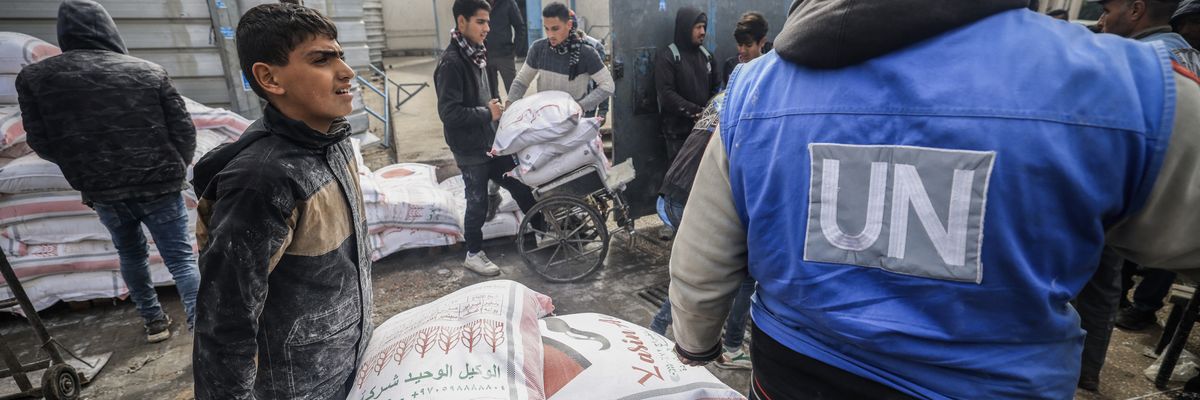
Israel Cannot Hide From the International Court of Justice
Israel urgently requires leaders who embrace international law over military force, humility over arrogance, and peacemaking over brutality.
JEFFREY D. SACHS
Jan 29, 2024
It is easy to be cynical about the international rule of law. No sooner had the International Court of Justice (ICJ) found that Israel is plausibly committing genocide against the Palestinian people than the U.S. State Department declared, “We continue to believe that allegations of genocide are unfounded and note the court did not make a finding about genocide or call for a ceasefire in its ruling…” Israeli leaders declared the case to be “outrageous” and “antisemitic.” Yet the risks for Israel of the ICJ ruling, and its follow-up in the next year or two, are profound. If Israel spurns the Genocide Convention, it imperils its place within the community of nations.
True, the ICJ provisional ruling by itself will not end Israel’s war in Gaza or perhaps the mass killing of the Palestinian people, already at 26,000 and rising (with 70 percent women and children). The ruling by itself will not end America’s complicity in Israel’s slaughter of Palestinians. Israel could not fight the war in Gaza one more day without the U.S. providing the munitions and other military support.
Yet the ruling has started the clock on Israel’s future. If Israel continues to act with impunity and finds itself declared as genocidaire in the ICJ’s final ruling, Israel will become a pariah state. Young Americans in particular will pull the plug on U.S. backing for Israel. Israel will stand utterly alone, condemned by the world.
Israelis should understand that the U.S. cannot—and will not—save Israel in the long run.
Most of the 193 governments in the United Nations already disdain Israel’s behavior. Most see a country that has occupied the neighboring territories of Palestine for 57 years (since the 1967 war), that has scorned and failed to act on dozens of votes by the UN Security Council and the UN General Assembly, and illegally and blatantly settled more than 700,000 Israelis in the occupied territories.
Most UN member states hear clearly the expressions of visceral hatred by many Israeli leaders toward the people of Palestine. For example, the statement by Israeli President Herzog blaming all of the people of Gaza, as cited by the ICJ; and they understand clearly the intention of today’s Israeli government to occupy Palestine and rule over the 7 million Palestinian Muslims and Christians living in Israel and Palestine today. South Africa brought the ICJ case against Israel in part because it knows murderous apartheid rule when it sees it, and it sees apartheid rule in Israel’s ongoing domination over the Palestinian people.
Israel has so far not been deterred by global opinion because of its nuclear weapons, its messianic zeal, and most importantly, the military, financial, and public backing of the United States, including its votes in the UN Security Council and General Assembly. Moreover, the U.S. and Israel have acted on the belief that the offer of American money and weapons systems to the Arab nations would induce them to turn their backs on Palestinian people. Israel and the U.S. act with supreme arrogance, believing that military might makes right and that money talks. Yes, Israel also acts out of fear of the Palestinians, but that is the overbearing and grossly unjustified fear of the underdog, the conquered, and the displaced. By recognizing and making peace with an independent state of Palestine, Israel would remove the hate and humiliation that fuels support for Hamas, and thereby diminish the threats that lead to Israel’s own fears.
Israelis should understand that the U.S. cannot—and will not—save Israel in the long run. It will not do so any more than America has “saved” South Vietnam; Iran after the U.S.-U.K. coup in 1953; Afghanistan after 2001; Iraq after the U.S. overthrow of Saddam Hussein in 2003; Syria after the U.S. attempted overthrow of Bashar al-Assad in 2011; Libya after the NATO overthrow of Moammar Qaddafi in 2011; or Ukraine since the U.S.-led coup in 2014. American military force is useless or worse in sustaining regimes that lack broad international support and legitimacy. America tires of each misguided military adventure and moves on, and will eventually do so vis-à-vis Israel if Israel becomes a pariah and outlaw state.
Nor will U.S. money and weapons systems carry the day with the Arab neighbors. The U.S. is at the end of its financial largesse. The U.S. public debt is already 122.9 percent of GDP and rising rapidly. There is no consensus in Washington, D.C. on how to stabilize the U.S. budget, but one point is clear: large support for foreign countries will not be part of the bargain. The cutoff of U.S. financing for Ukraine, despite the intense lobbying by the politically powerful military-industrial complex, is a vivid case in point. Even access to advanced U.S. weapons systems will not persuade Arab nations to abandon the cause of a Palestinian state. In any event, Russian, Iranian, North Korean, Chinese, and other advanced weapons systems will be on highly competitive offer in future years, and with better financing terms.
At the moment, the Israeli public ardently backs Israel’s brutality and slaughter in Gaza. The public is gripped by a combination of overwhelming fear, religious zealotry, and state propaganda. Israelis widely believe that the Arab nations are implacably out to destroy Israel. They do not travel in the Arab countries and do not know or understand the attitudes and policies of those neighboring societies. They do not attend to the statements of Arab and Islamic leaders calling for peace based on the two-state solution because Israeli mainstream media, like U.S. mainstream media, is in the grips of relentless state propaganda, brain-deadening patriotism, and relentless war-mongering.
Israeli society is immeasurably traumatized by the Nazi Holocaust, which remains the central fact of modernity and memory of every Jewish family of European roots in any part of the world. An eventual finding by the world’s highest court that Israel itself has now become a perpetrator of genocide will therefore shake Israeli society to the roots and will rupture Israel’s social contract with world Jewry. At that very painful and very dire stage, Israeli public opinion may begin to reconsider its current assumptions.
Yes, despite the ICJ ruling Israel’s killing goes on, but under greatly heightened legal and political scrutiny. Every Israeli murder in cold blood, every bombing of a hospital, every destruction of a Palestinian school or university, every Israeli denial of food and water for Gazans, will be meticulously recorded by South Africa’s superb legal team, and by highly respected legal institutes around the world, including the Center for Constitutional Rights and Law for Palestine. All will be duly conveyed to the ICJ.
Palestine will survive the current horrific ordeal, deeply wounded but with strong worldwide backing. Israel’s future, by contrast, hangs in the balance, as it could soon find itself banished by the community of nations as a stark violator of international law. Israel urgently requires leaders who embrace international law over military force, humility over arrogance, and peacemaking over brutality. And Israel—no less than the United States—must come to understand the self-destructive futility of deploying military force to deny justice and political rights for the Palestinian people.
Our work is licensed under Creative Commons (CC BY-NC-ND 3.0). Feel free to republish and share widely.
JEFFREY D. SACHS is a University Professor and Director of the Center for Sustainable Development at Columbia University, where he directed The Earth Institute from 2002 until 2016. He is also President of the UN Sustainable Development Solutions Network and a commissioner of the UN Broadband Commission for Development. He has been advisor to three United Nations Secretaries-General, and currently serves as an SDG Advocate under Secretary-General Antonio Guterres. Sachs is the author, most recently, of "A New Foreign Policy: Beyond American Exceptionalism" (2020). Other books include: "Building the New American Economy: Smart, Fair, and Sustainable" (2017) and "The Age of Sustainable Development," (2015) with Ban Ki-moon.
International Court of Justice President Joan Donoghue and ICJ judges arrive prior to the verdict announcement in the genocide case against Israel brought by South Africa in The Hague, Netherlands on January 26, 2024.
(Photo: Remko de Waal/ANP/AFP via Getty Images)






